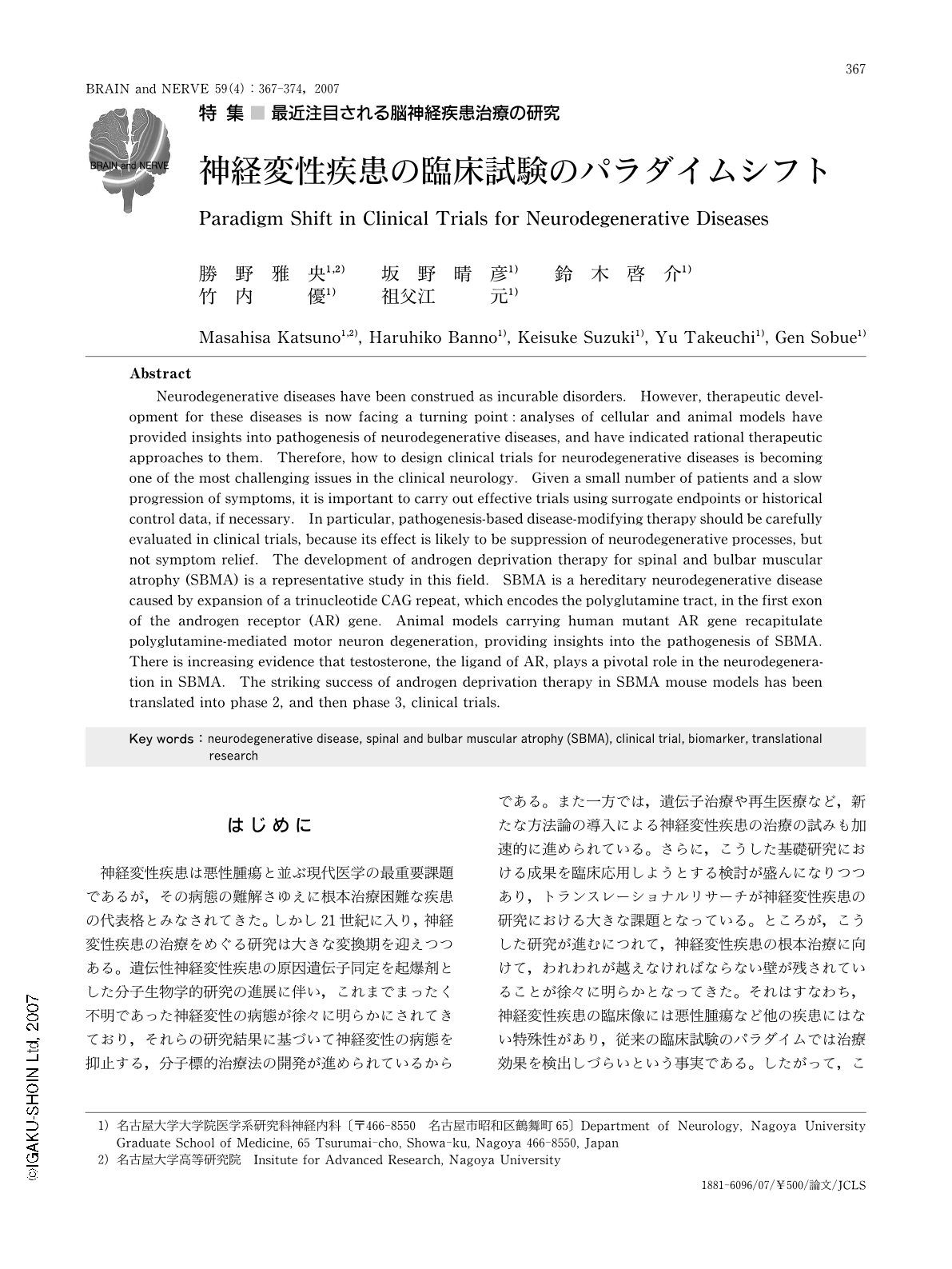Japanese
English
- 有料閲覧
- Abstract 文献概要
- 1ページ目 Look Inside
- 参考文献 Reference
はじめに
神経変性疾患は悪性腫瘍と並ぶ現代医学の最重要課題であるが,その病態の難解さゆえに根本治療困難な疾患の代表格とみなされてきた。しかし21世紀に入り,神経変性疾患の治療をめぐる研究は大きな変換期を迎えつつある。遺伝性神経変性疾患の原因遺伝子同定を起爆剤とした分子生物学的研究の進展に伴い,これまでまったく不明であった神経変性の病態が徐々に明らかにされてきており,それらの研究結果に基づいて神経変性の病態を抑止する,分子標的治療法の開発が進められているからである。また一方では,遺伝子治療や再生医療など,新たな方法論の導入による神経変性疾患の治療の試みも加速的に進められている。さらに,こうした基礎研究における成果を臨床応用しようとする検討が盛んになりつつあり,トランスレーショナルリサーチが神経変性疾患の研究における大きな課題となっている。ところが,こうした研究が進むにつれて,神経変性疾患の根本治療に向けて,われわれが越えなければならない壁が残されていることが徐々に明らかとなってきた。それはすなわち,神経変性疾患の臨床像には悪性腫瘍など他の疾患にはない特殊性があり,従来の臨床試験のパラダイムでは治療効果を検出しづらいという事実である。したがって,こうした問題点を解決することが,今後の神経変性疾患の治療開発の鍵を握っていると考えられる。本稿では,筆者らが取り組んでいる球脊髄性筋萎縮症(spinal and bulbar muscular atrophy: SBMA)に対する病態抑止療法の開発の現状を題材として,神経変性疾患に対する臨床試験のパラダイムシフトについて述べることとする。
Abstract
Neurodegenerative diseases have been construed as incurable disorders. However, therapeutic development for these diseases is now facing a turning point:analyses of cellular and animal models have provided insights into pathogenesis of neurodegenerative diseases, and have indicated rational therapeutic approaches to them. Therefore, how to design clinical trials for neurodegenerative diseases is becoming one of the most challenging issues in the clinical neurology. Given a small number of patients and a slow progression of symptoms, it is important to carry out effective trials using surrogate endpoints or historical control data, if necessary. In particular, pathogenesis-based disease-modifying therapy should be carefully evaluated in clinical trials, because its effect is likely to be suppression of neurodegenerative processes, but not symptom relief. The development of androgen deprivation therapy for spinal and bulbar muscular atrophy (SBMA) is a representative study in this field. SBMA is a hereditary neurodegenerative disease caused by expansion of a trinucleotide CAG repeat, which encodes the polyglutamine tract, in the first exon of the androgen receptor (AR) gene. Animal models carrying human mutant AR gene recapitulate polyglutamine-mediated motor neuron degeneration, providing insights into the pathogenesis of SBMA. There is increasing evidence that testosterone, the ligand of AR, plays a pivotal role in the neurodegeneration in SBMA. The striking success of androgen deprivation therapy in SBMA mouse models has been translated into phase 2, and then phase 3, clinical trials.

Copyright © 2007, Igaku-Shoin Ltd. All rights reserved.


